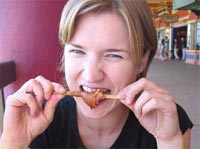Biological clock signals meal times
 Like an alarm clock in your body, rely on the sun to tell your employer when to go to bed, you also have a "food" watch that reminds you when to eat.
Like an alarm clock in your body, rely on the sun to tell your employer when to go to bed, you also have a "food" watch that reminds you when to eat.
In a new study, a group of US and Japanese researchers said they had detected a gene in mice that plays a role in helping the " food " watch to take over the alarm clock when needed. The results could help scientists regulate the body's clocks to help obese people lose weight.
Scientists have long known about the 24-hour biological alarm clock, which regulates the awakening cycle by day and night."It's a magical clock, controlling everything else under normal conditions , " said Dr. Masashi Yanagisawa of the University of Texas.

Dr. Masashi Yanagisawa
But recently, scientists have recognized another type of "food" watch. In the new study, the team tried to understand how it works by modifying the mouse's eating cycle.
Rats are species that work at night and often eat at night. But scientists adjust their eating patterns by just letting food appear for a short time during the day.
As a result, the mouse changes its sleep pattern after a few weeks, gradually becoming a daytime species. The mice also increased their waking behavior and sought food just before the food was available.
Through mouse brain analysis, the team found that certain genes were turned on at mealtimes. Obviously, these genes have taken over some other genes that function to inform mice that should go to sleep during the day."Food" watches are often in a static state, but in this experiment, food becomes more important than light, the animal suddenly ignores the key alarm clock and the "food" jump clock. Yanagisawa said.
According to Yanagisawa, the next step is to understand how this watch regulates appetite and motivation to eat, thereby helping obese people to lose weight.
MT
- Detecting the biological clock 'adjustment button' of the human body
- Find a way to decode the biological clock
- Application for people with biological clock disturbance
- What to do to adjust the biological clock
- How to optimize the body's biological clock?
- Weather affects the human biological clock
- Body biological clock of 2.5 billion years old
- Detecting biological clock predicting human life expectancy
- Working at night breaks down the brain biological clock
- Discover the secret of human biological clock
- Mysterious biological clock hidden in tiny molecules
- The biological clock of the body
 Green tea cleans teeth better than mouthwash?
Green tea cleans teeth better than mouthwash? Death kiss: This is why you should not let anyone kiss your baby's lips
Death kiss: This is why you should not let anyone kiss your baby's lips What is salmonellosis?
What is salmonellosis? Caution should be exercised when using aloe vera through eating and drinking
Caution should be exercised when using aloe vera through eating and drinking